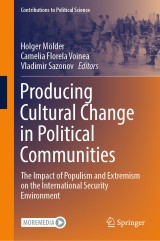Details

Producing Cultural Change in Political Communities
The Impact of Populism and Extremism on the International Security EnvironmentContributions to Political Science
|
117,69 € |
|
| Verlag: | Springer |
| Format: | |
| Veröffentl.: | 13.11.2023 |
| ISBN/EAN: | 9783031434402 |
| Sprache: | englisch |
Dieses eBook enthält ein Wasserzeichen.
Beschreibungen
<br><div><p>In light of many crises in the last two decades, including democratic recession, climate change, economic crises, and massive waves of migration affecting perceptions of security around the world, this book examines the impact of cultural change in political communities on the global political and security environment. Through various case studies of political communities around the world, the book analyzes contemporary responses to cultural change, often culminating in the rise of political populism and extremism.</p>
<p>The book is divided into two parts and presents a foreword by Larry Diamond and an afterword by Eric Shiraev. The first part focuses on the micro-level of cultural change in political communities and discusses conflict mechanisms and the role of political participation in producing changes. The second part features studies on extremism and populism, analyzing their impact on cultural change in Europe. The book is intended for scholars and students in a variety of disciplines, including international relations, security studies, cultural studies, and related fields.</p><br></div>
<p>The book is divided into two parts and presents a foreword by Larry Diamond and an afterword by Eric Shiraev. The first part focuses on the micro-level of cultural change in political communities and discusses conflict mechanisms and the role of political participation in producing changes. The second part features studies on extremism and populism, analyzing their impact on cultural change in Europe. The book is intended for scholars and students in a variety of disciplines, including international relations, security studies, cultural studies, and related fields.</p><br></div>
<div><div>Chapter 1. Introductory chapter: cultural change in political communities and twenty years of crisis in the 21st century (Holger Mölder).- Part I. Contemporary Conflict, Political Participation and Cultural Change.- Chapter 2. Societies open to conflict. Political Culture and</div><div>Digitalization in the European Political Landscape (Camelia Florela Voinea).- Chapter 3. Lower-Spectrum Conflict Mechanisms (Julien Theron).- Chapter 4. Political culture and political agency: from Gaugamela to Mosul (Sebastian Fink).- Chapter 5. Personalism, Symbolism and Power in San Luis, Argentina. Cultural Change and Political Practices in San Luis, Argentina (Sergio Quiroga).- Chapter 6. The Changing Landscape of the Political Participation of Kazakhstan Citizens: Before and After the Political Transition Following 2019 (Shugyla Kilybayeva).- Part II. Populism, Extremism and Cultural Change.- Chapter 7. Populism, extremism and cultural change as traceable in the European Value Study (Klaus G. Troitzsch).- Chapter 8. Polish-Belarus border in the political narrative during the migration crisis in 2021-2022 (Katarzyna Jędrzejczyk-Kuliniak).- Chapter 9. Make live and let die: biopolitical borders, migrants and</div><div>refugees in PIS’ Poland (Alexandra Yatsyk).- Chapter 10. Promoting Peace to end Russia’s War against Ukraine: An unholy alliance between the Far Right and Far Left in Germany? (Florian Hartleb).- Chapter 11. The impact of war in Ukraine on the political and ideological agenda of European post-communist state conservative populists: the case of EKRE (Illimar Ploom).- Chapter 12. The Russia Discourses of Estonian Populists: Before and After the War in Ukraine (Andrey Makarychev).- Chapter 13. War of narratives and revisionist challenge – the evolving strategic partnership between the New Right movement in the United States and the Russian Federation (Holger Mölder)</div></div>
<p><b>Holger Mölder</b> is Associate Professor in International Relations at the Department of Law, School of Business and Management, Tallinn University of Technology and Research Fellow at the Estonian Military Academy, Estonia and his research focuses on various international security issues, cognitive warfare, political and security cultures.</p><p><b>Camelia Florela Voinea</b> is Associate Professor at the Department of Public Policy, International Relations and Security Studies, Faculty of Political Science, University of Bucharest (Romania), and Director of the European Research Center for Political Culture. Her research areas include political culture, political attitudes, migration and security risks, political methodology, modeling, and simulation research.</p><p><b>Vladimir Sazonov</b> is Leading Researcher at the Estonian Military Academy and Associate Professor at the University of Tartu (Estonia). His research areas include hybrid warfare, Middle East, Russian information warfare, and history.<br></p><p><br></p>
<br><div><br></div><div><p>In light of many crises in the last two decades, including democratic recession, climate change, economic crises, and massive waves of migration affecting perceptions of security around the world, this book examines the impact of cultural change in political communities on the global political and security environment. Through various case studies of political communities around the world, the book analyzes contemporary responses to cultural change, often culminating in the rise of political populism and extremism.</p><p>The book is divided into two parts and presents a foreword by Larry Diamond and an afterword by Eric Shiraev. The first part focuses on the micro-level of cultural change in political communities and discusses conflict mechanisms and the role of political participation in producing changes. The second part features studies on extremism and populism, analyzing their impact on cultural change in Europe. The book is intended for scholars and students in a variety of disciplines, including international relations, security studies, cultural studies, and related fields.</p></div><div><br></div>
Examines cultural change in political communities Presents case studies of populist and extremist politics Analyzes the conspiracy theories of the Kremlin

















